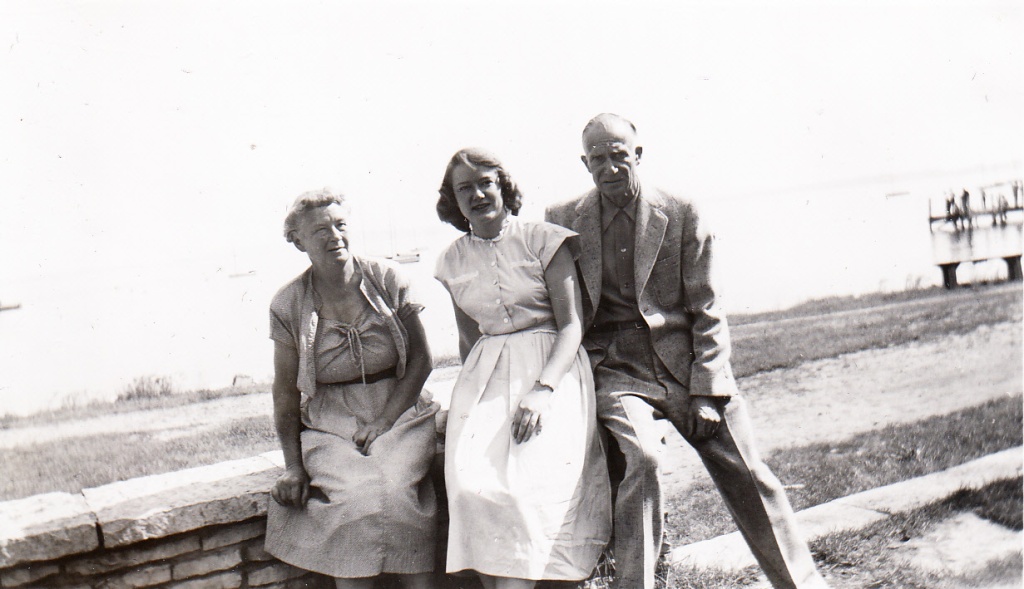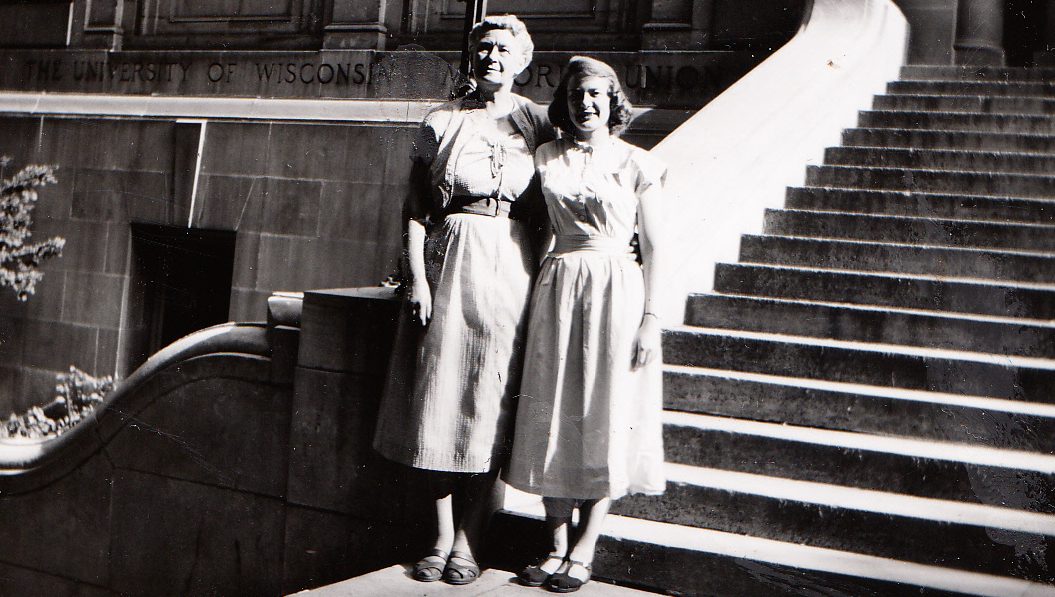
Although Mata’s 1940s diaries aren’t nearly as detailed as those from her younger days, there is enough to paint a picture of her relationship with her only child, Barbara. There are small praises about her sprinkled throughout the diary entries such as Barbara, the “good girl” or Barbara, the “dear girl” and many glimpses of Mata helping Barbara do something, like, for example, a school assignment. There’s plenty of small bits of evidence to show that Mata was proud of her daughter.
But, in a tale as old as time, tension arose when Barbara became all grown up. As with all teenagers, Barbara sought some level of independence, and it was a difficult thing for Mata to accept. Take, for example, one of the better-written passages from 1945:
“Barbara [is] out + I feel uncannily blue about it. So it goes, up to now she seldom went—unless a definite place. But now Janice calls her + they go to town. And now she already wants to stay—later + go several times a week. And doesn’t tell much. And all that I longed for she was, but now comes ‘the being like the rest.’ She loves her home + I wish she’d carry on—by limiting herself to one night a week. Some day she’ll feel sorry—for how short a time are ones [sic.] parents here.”

school graduation, 1946
Mata also sized up Barbara’s teenage dates, as she did with a boy named Glen in 1945, who Barbara had a year-long relationship with. Mata wrote a few observations about him: “Seems nice, but too well to do. He + his suspenders over shirt + no coat…He is a real boy—not the spend thrift kind…Do hope Glen will come again—because he doesn’t smoke or drink + is a nice companion.” And she tracked the relationship to its conclusion just before Barbara headed off for college in 1946.
But, for her own reasons, Mata blamed herself to some extent for the end of Barbara and Glen’s relationship. And the Oct. 15, 1946 entry where she expresses her thoughts about this is one of the most insightful of the 1940s diaries:
“…To think I had encouraged her to keep company with a young student of Lincoln High, and he turned out to be no good. Poor kid, he seemed to be all right, but how often does one think a person is O.K. when he really isn’t. I didn’t mean any harm I understood that he came from good substantial family + so I thought he was a good kid. Well, I suppose we all have our faults + maybe when he grows older, he may develop into a better man. I thought she was having fun. Now I hoped she’d give him a pict[ure] + go tell Jan. I made such a mistake to say that. But I meant nothing by it. I only thought they were enjoying each other because he’d come up to see her often. But I guess I myself turned her against him. It was really my fault that Barbara decided to rule him out. If she ever in the last few months of 1946 goes back to him, I promise that I’ll not interest myself in their date. I guess I spoiled it all for her always asking about him. Maybe it’ll all come out O.K. She is such a wonderful understanding person…she’[ll] make a better person out of anyone. Anyway I guess G. some day will appreciate what a jewel she really is.”
Mata continued to concern herself with Glenn and Barbara in the following days and weeks. On Oct. 18, she wrote: “Homecoming parade + game Sat. But I have no heart for a thing. I feel so badly about B. + G.’s break up. So disappointed that she learned to dislike him so. And what she sees in Mahlick, well—beyond me. Richard perhaps. But wait in long run all may prove worse than G.”
And she didn’t leave it at that, because on Nov. 6 she wrote another lengthy entry about it:
“A ex soldier h[igh] s[chool] boy…got fond of Barbara, too, + so double date, after she tried to tell him she was so busy. And whistles when he comes in house. G.G. had faults, too, but in house he acted quite gentlemanly. Didn’t smoke or whistle, but one night he chewed gum vigorously when Barbara waited too long on night of Sr. Country Club dance…Barbara has new dates. Joe Mahlick former date of a 2 junior events—took it upon himself to renew dates. He’s not a fellow a girl takes to—a shy, quiet piece—treat them all alike, sympa[thetic] kind—accepts him. But she trimmed down the dates to a bore, minimum, so I guess he’s not encouraged to pursue. She discouraged Glenn hopelessly—so. Then a date from Man. boy finishing hi[gh school]. Both ex soldiers, + the soldiers are pretty much contaminated. Now Glenn + Joe rang the bell—who is next of the boy searching maze. Glenn never again. He made his farewell visit finally + so the end I prophesied, the night of that fatal game came. Now strange that I felt something had gone wrong + sure he came only 2x’s after that, and stayed only for a moment. According to rule, things in 3’s—he may come again. But why should he? Barbara has friends who show her better times; better characters, better looking, better companions, perfect “dates.” Well, he tried to be that, but maybe someday he’ll find a girl who’ll overlook his faults.”
Two weeks later, on Nov. 21, Mata brought up Glen again with Barbara. While Mata seemed to pity the boy, she also seemed happy that Barbara was apparently popular among other boys: “Barbara [has] a date with Dan after Spanish. Asked her if G. still to come. Yes, he’d run up again sometimes. So all in all if then she goes with both, each having his own freedom—O.K. Boys like her because she’s an all around good honest soul, pretty smart + modern, but not wild + boys like G. recognize her good traits + so he sticks even if he can’t get her too often. Anyway she is popular.”
Many months later, in early June 1947, Mata finally concluded the long saga when she wrote: “Barbara saw G. at prom. Poked him + now each new partners—so final closing of a 16 month chapter. My hopes spring out of a dead soul. A mushroom—it comes—only to drop over when plucked.”
With that story over, there were still other problems that Mata had in relation to Barbara, such as when Barbara drank alcohol for the first time. This did not make Mata happy: “I laugh; heart is in a thousand shreds. The day will never come again. Barbara tasted a bit of drink + it made my heart ache. She’s good + understanding. But why didn’t she wait until older. Just a few drops in a soda. But how much stronger one would be nowadays to resist often, because opportunities came too often to stave off further temptations.”
Then there was the perennial problem of curfews: “Barbara out with the Maribel boy. In spite of my pleading it’s late again—around 3. If only I can pound it into her—the late hours. Every one questions that—no matter how fine the character is.”
But the most explosive moment that Mata recorded in her diary was set off by something extremely trivial: “Just think the damm [sic.] fool says, “Mayta [sic.]! don’t yell so”—That to me when I thought she was in her room when she to come to the phone. And she expects me to whisper. No, never in my life have I felt that inner spirit of goneness—as I have this year + last. What an idiot I am in her eyes. What a damm [sic.] fool. I am to sink so low in this life so if ever they want her, I’ll simply make no issue of it—barely whisper to her. Lousy! Suggest she ask the boy’s name. Oh! no—suggest she look at Bob’s Marine suit. Oh! no what a kill joy!! No wonder! Well, now I can see the whole thing clearly! It took a life time to get my heart smashed. She has done it.”
Even though Barbara only ventured 150 miles away for college at the University of Wisconsin in Madison, it was yet another difficult transition for Mata to accept. Mata still wanted to be directly involved in her life. She lamented the fact that Barbara found others to confide in: “I know Barbara loves her parents. She’ll never know how much it would mean to have her always come to me with all her problems. If she’d only discuss things with her mother as I did with mine. Why must girls always tell a girl friend, all about a boy friend + a mother only guesses.” But this, too, Mata learned to accept.

But, despite all of the problems, there was always positivity hidden somewhere in Mata, even if it didn’t always manifest itself. Looking back on her life experience and how she finally achieved what she had wanted for so long—a family of her own—Mata occasionally brought her feelings back into perspective in her writing. She knew what Barbara meant to her, even in times of trouble: “Barbara is my all—her interest, her nice boy friend—helps me to bear all these things that bear down upon me!!”
Such a gift to have ancestors who were literate and actually kept diaries!! Wish I had such insights into my family. In these images, “Mata” looks like one tough General Officer!!!
LikeLiked by 1 person